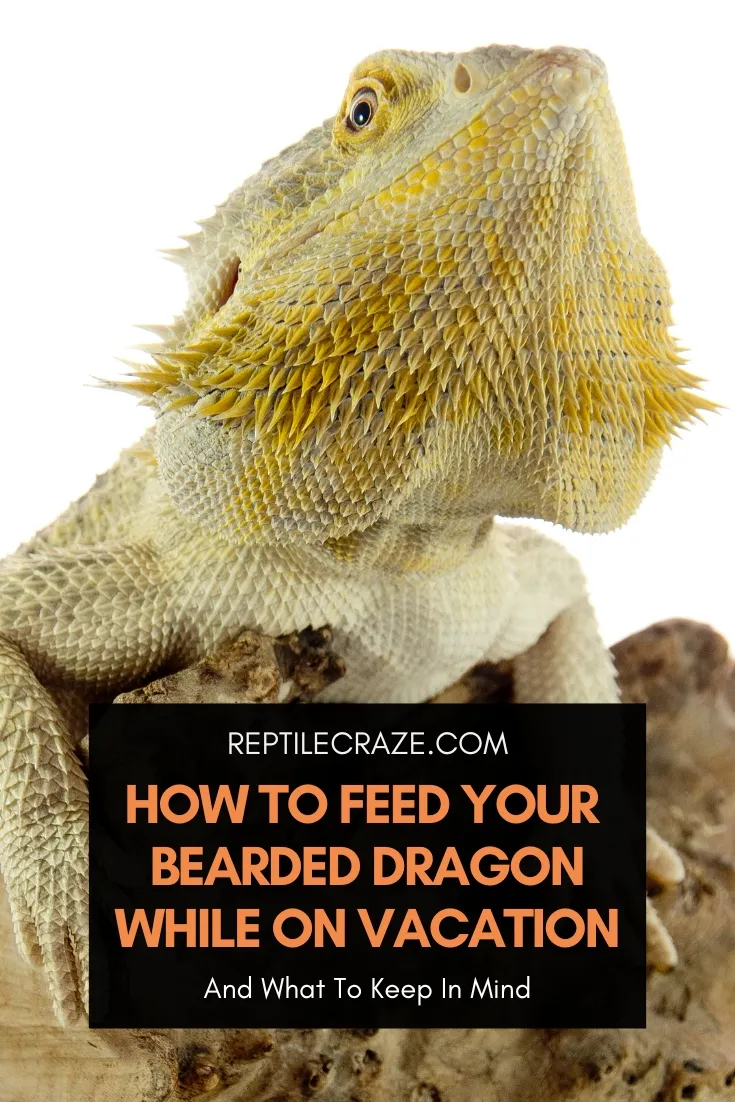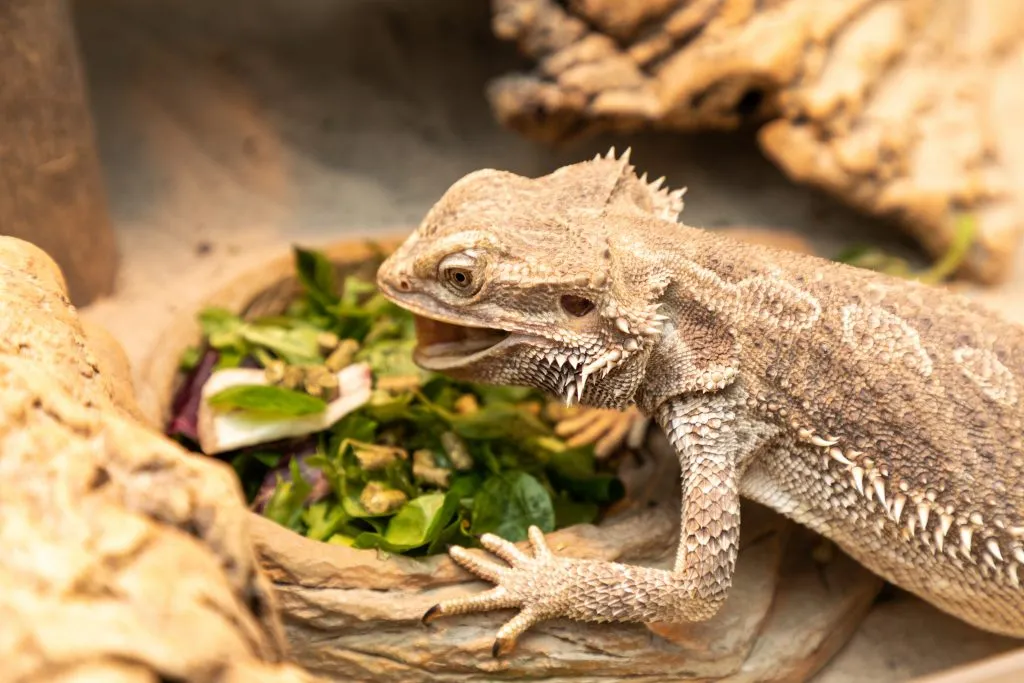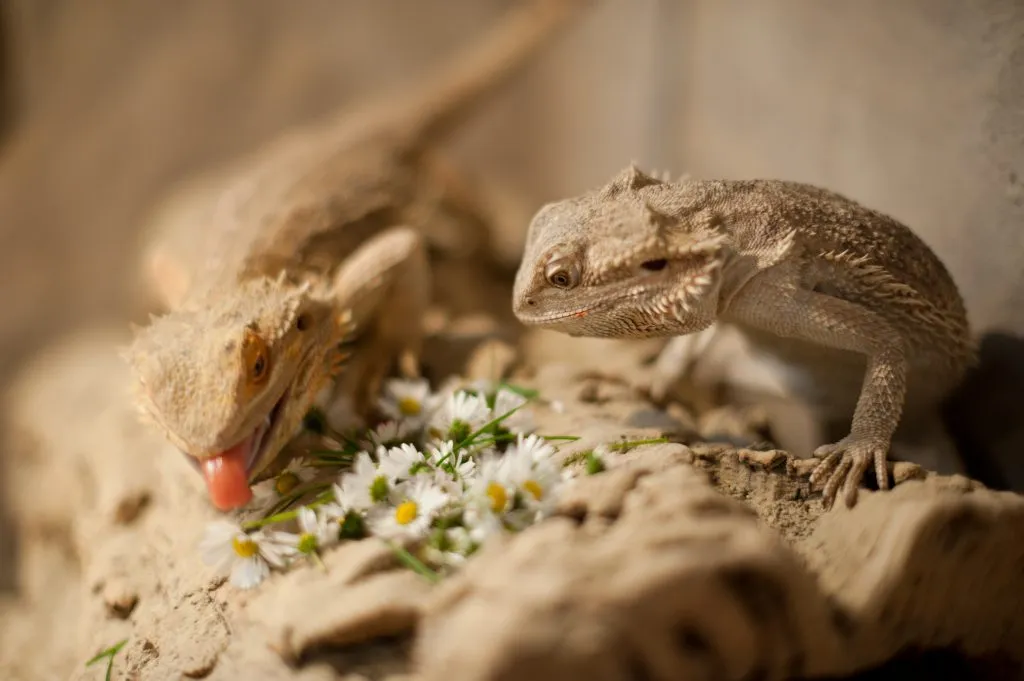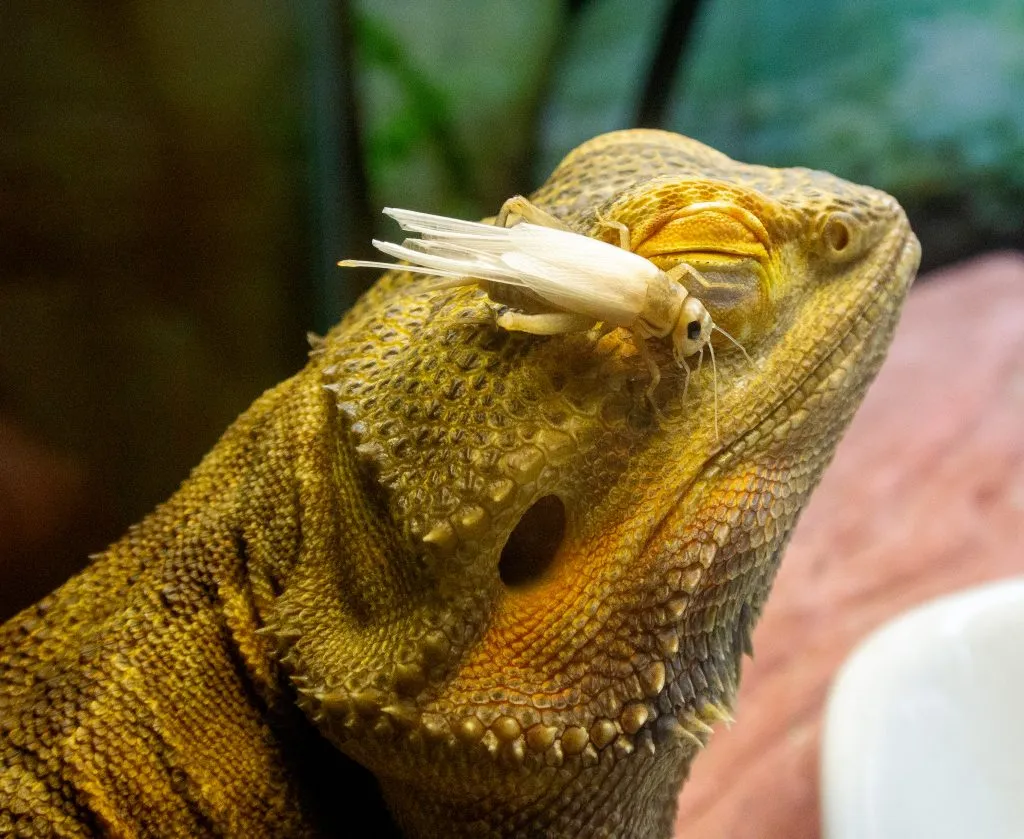
So, you want to -or need to- get away for a few days or weeks, but, as a responsible bearded dragon’s owner, you are worried about leaving your pet alone or with another person whom they are not used to, and on top of all that you are also wondering about how to feed your bearded dragon while on vacation.
Leaving herbs and edible plants in the enclosure will be sufficient to feed a bearded dragon while on vacation. Adult bearded dragons can go without
We get it, all pet-owners have been in your position at some point, it is not easy to enjoy your vacation if you are worrying about your pet who is alone at home. That is why we are going to tell you everything you need to know before going on your trip, so you can make sure your bearded dragon stays happy and healthy until you get back.
Table of Contents
Leaving Your Bearded Dragon For One Week Or Less
Leaving your adult bearded dragon alone for three to four days should be absolutely fine, even stretching your trip for a week may be all right as long as you do not do it regularly.
However, this is not true for baby and juvenile bearded dragons. The younger your beardie is, the less time you can safely leave him or her alone.
While it might be acceptable to leave your juvenile bearded dragon for one day, two or more days may be risky.
In the case of baby bearded dragons, you should never leave them alone, not even for a single day.
Before leaving for your vacation, make sure to feed your bearded dragon with a nutritious high protein meal to ensure your pet does not get hungry while you are on your trip.
Always make sure to remove the remaining live insects from the
It is highly recommended that you arrange for a person that can come and check your pet at least once per week in the case of adult beardies or everyday in the case of baby beardies.
Leaving Your Bearded Dragon For More Than One Week

Leaving your bearded dragon alone for more than one week is not recommended (unless you force it to go in brumation, but we will talk about that later).
If you necessarily have to leave your pet alone for more than one week, here are some recommendations you can follow:
- Ask a friend, neighbor, or family member to take care of your pet.
- Hire a specialized pet sitter, or at least someone with experience handling bearded dragons.
- Try to find a reputable reptile boarding facility for your pet. Some veterinarians, animal shops, or reptile breeders offer this service.
If none of these are viable options, or you are unable to find a person that can come check on your pet regularly, you can try setting up a webcam to keep an eye on your beardie.
By using a webcam, you can monitor your pet by yourself and call someone only if something happens or you notice something is wrong with your beardie.
Best Foods To Leave For Your Beardie While On Vacation
Bearded dragons are omnivores, meaning that they eat plants and animals.
In the wild, their diet is varied, and they cannot afford to be picky eaters. Young bearded dragons eat mostly insects, but as they grow older their diet starts to consist of mainly greens.
Still, bearded dragons are more resilient than you may think. In the wild, they can go without
However, this does not mean you can leave your dragon completely unattended every time you take a trip. So, what do you do?
Here are some suggestions you can take into consideration to make sure your bearded dragon is still taken care of while you enjoy your vacation:
Leave Some Herbs In The Enclosure

Herbs are a great option to put into your bearded dragon’s enclosure because, since herbs only dry out, you do not need to worry about them becoming moldy after a few days.
Even more, some beardies love to eat dry herbs, so your pet will not go hungry even if they dry out.
Great herb options include:
- Basil
- Rosemary
- Cress
- Sage
- Oregano
- Dill
- Peppermint
- Lemon Balm
- Thyme
- Chives
- Lovage
- Marjoram
- Parsley
- Savory
- Catnip
- Lucerne
Young bearded dragons may refuse to eat herbs or veggies at first, but they can start eating them if you offer new varieties each day a few weeks in advance before your trip.
Put A Few Plants In The Tank
You can place one or more bearded-dragon-safe plants in the enclosure for your pet to nibble on when you are away.
Just make sure to get plants free of potentially harmful chemicals like pesticides or fungicides.
Some good plant options for your bearded dragon include:
| Dwarf jade/Elephant bush/Spekboom (Portulacaria afra) | This plant is a low-maintenance and easy to grow succulent. You can grow it on the warmer side of your beardie’s |
| Blushing bride/Sky plant (Tillandsia ionantha) | This is a beautiful air plant that can effortlessly grow on a log or piece of wood in your bearded dragon’s |
| Hibiscus (Hibiscus rosa-sinensis) | Hibiscus is a beautiful tropical plant with trumpet-shaped flowers. It is a bit delicate, so it is better to put it in a place where your pet cannot accidentally crush it. |
| Echeveria (Echeveria spp.) | This is a beautiful low-maintenance and easy to grow type of succulent. It can thrive when placed on the warmer, drier side of the enclosure. |
| Bolivian wandering jew/Dwarf Bolivian wandering jew/Turtle vine (Callisia repens) | Bolivian wandering jew is a compact plant with small leaves that is great for creating ground coverage in the enclosure. |
| Wheatgrass (Triticum aestivum) | Wheatgrass is a great addition to your beardie’s enclosure as this plant provides a good source of protein and nutrients. |
What To Do About Water

Bearded Dragons do not need much water as they live on mostly dry woodlands in the wild, where rain and other water sources are scarce.
As a matter of fact, bearded dragons can get most of their water requirements only from
Therefore, your beardie will be just fine if you provide them with just plants and herbs for a short period of time.
Nevertheless, a small and partly filled water bowl should still be provided for drinking purposes and to help maintain the tank’s humidity levels. You can also use this small waterer.
Keep in mind that the water bowl should be cleaned and refilled at least two times per week.
Using An Automatic Feeder For Your Beardie
Although automatic feeders might be a good option for short trips, they are not really suitable for feeding your pet while you are on a long vacation.
This happens mostly because automatic feeders are designed for dried insects, which usually have a hard exoskeleton that can upset your bearded dragon’s digestive system if eaten too frequently.
Another option is a hanging worm tray (like this one) where you can put live worms that will slowly fall into the enclosure for your dragon to enjoy.
The downside of a hanging worm tray is that it is not automatic and you cannot control the meal portions your beardie can have. Besides, worms may end up getting all over the enclosure, which is neither safe nor sanitary for your beardie.
Inducing Brumation On Your Beardie While On Vacation
Brumation refers to a state of torpor in cold-blooded animals such as reptiles, which is similar to hibernation in warm-blooded animals.
In the wild, brumation is triggered by low temperatures.
Once the temperature gets consistently cold enough for several days, bearded dragons seek shelter under a rock, in a hollow log, or anywhere it seems safe.
Then, the bearded dragon’s metabolic rate will slow down and its appetite will decrease or even cease for two to three months. The beardie will stay mostly inactive during this time.
You can artificially induce a brumation state by slowly decreasing the temperature of the basking area to 75-80°F (24-27°C) during the day and to 60°F (16°C) during the night for four to six weeks.
You can do that by simply reducing the time the heat lamps are turned on and by moving the heat lamp further away from the enclosure.
Eventually, before leaving for vacation, the lights should be turned off completely.
To get your bearded dragon out of brumation, you must gradually increase the temperature and light over a few weeks. Once your beardie resumes its normal behavior, you can resume feeding.
Before doing that, you should bring your bearded dragon to a vet to make sure that your beardie is absolutely healthy and well-fed.
What To Feed Your Beardie When Getting Back From Vacation
Get your beardie some fresh
Refrain from feeding dried insects to your beardie at this time since such meal can cause some digestive issues.
- Enchi Ball Python: A Unique and Stunning Morph of Python regius - March 27, 2025
- Emerald Tree Monitor: The Enigmatic Green Guardian of the Rainforest - March 26, 2025
- The Egyptian Cobra (Naja haje): A Fascinating Serpent - March 25, 2025


